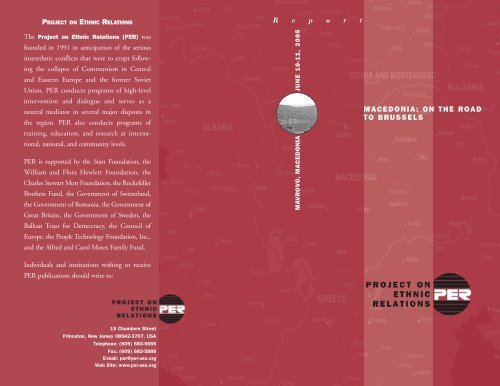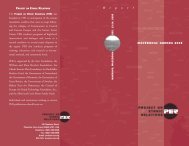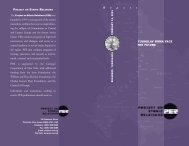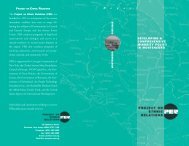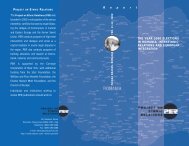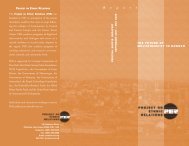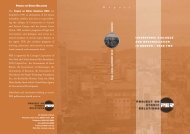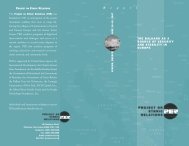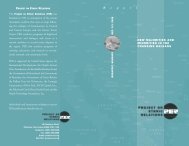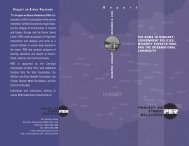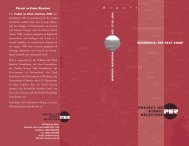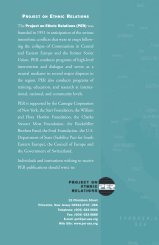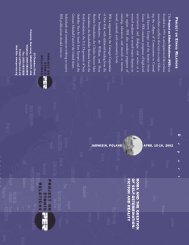PER Mavrovo Report-9-16-05 - Project on Ethnic Relations
PER Mavrovo Report-9-16-05 - Project on Ethnic Relations
PER Mavrovo Report-9-16-05 - Project on Ethnic Relations
- No tags were found...
You also want an ePaper? Increase the reach of your titles
YUMPU automatically turns print PDFs into web optimized ePapers that Google loves.
Play AreaProvisi<strong>on</strong>SchoolGroundsSemi naturalSports facilitiessignificance and sub-regi<strong>on</strong>al importance to a more intimatescale meeting immediate needs of residents.Includes exclusive play areas, play equipment, seating &bins, dog-free, high standards of safety, events andactivities. Resp<strong>on</strong>sive to changing demands (temporaryfacilities/summer schemes). Partnerships with schools, playschemes, youth services.Well defined boundaries and often secure, attached to aschool. Managed to a high standard and not visibly part ofthe public realm.Requires specialist attenti<strong>on</strong> and management andmaintenance skills. Creati<strong>on</strong> and c<strong>on</strong>servati<strong>on</strong> of diverseflora & fauna important.Formal playing pitched, changing facilities, bins & benches,signage.Also identified are any other designati<strong>on</strong>s (SSSI, SWS, LNR, C<strong>on</strong>servati<strong>on</strong>Area, Ancient M<strong>on</strong>uments, Listed Buildings, Locally Listed Buildings).Table 2 – Hierarchy Definiti<strong>on</strong>sSub-Regi<strong>on</strong>al Spaces or facilities that are either so large or highlyspecialist, that they achieve no pattern of accessibleprovisi<strong>on</strong> across the Borough. They attract the highestnumber of users from throughout the Borough, but alsofrom further afield. A high proporti<strong>on</strong> of users are likely totravel to these sites by car (Example: Arrow Valley Park).DistrictMajor facilities which will tend to attract most of their usersfrom across the Borough (Example: Mort<strong>on</strong> Stanley Park).Neighbourhood Smaller facilities which will attract users from a particularneighbourhood, or collecti<strong>on</strong> of residential areas(Example: Brockhill Park, Batchley Pool).LocalSmall facilities that attract users from a very smallpopulati<strong>on</strong> (Example: Lowlands Lane).Table 3 – Borough wide standardsBorough-wide informal Borough-wide informalunrestricted open space unrestricted open spaceminus Arrow Valley Park& sites below 0.4ha*Borough-wide formalopen space**9.08ha/1000 populati<strong>on</strong> 5.9ha/1000 populati<strong>on</strong> 8.6ha/1000 populati<strong>on</strong>* Arrow Valley Country Park and sites below 0.4ha are excluded from thisbecause they would not be requested in developer’s c<strong>on</strong>tributi<strong>on</strong>s** this includes amenity, parks and semi-natural open space2
PREFACEIn June 20<str<strong>on</strong>g>05</str<strong>on</strong>g>, the <str<strong>on</strong>g>Project</str<strong>on</strong>g> <strong>on</strong> <strong>Ethnic</strong> Relati<strong>on</strong>s (<str<strong>on</strong>g>PER</str<strong>on</strong>g>) and the Embassy ofSwitzerland in Maced<strong>on</strong>ia organized the fifth roundtable in the so-called“<str<strong>on</strong>g>Mavrovo</str<strong>on</strong>g> Process” series. These roundtables are an occasi<strong>on</strong> for membersof the Maced<strong>on</strong>ian governing coaliti<strong>on</strong> (the Together for Maced<strong>on</strong>iacoaliti<strong>on</strong> headed by the Social Democratic Uni<strong>on</strong> of Maced<strong>on</strong>ia(SDSM) and the Democratic Uni<strong>on</strong> for Integrati<strong>on</strong> (DUI)), the parliamentaryoppositi<strong>on</strong> and representatives of the internati<strong>on</strong>al communityto assess the implementati<strong>on</strong> of the Ohrid Framework Agreement (OFA)and evaluate the coaliti<strong>on</strong>’s progress. The discussi<strong>on</strong>s also provide aforum for h<strong>on</strong>est and open communicati<strong>on</strong>—off the record—am<strong>on</strong>g allparliamentary parties.The <str<strong>on</strong>g>Mavrovo</str<strong>on</strong>g> roundtables are always important events in Maced<strong>on</strong>ianpolitics. They provide a forum wherein difficult and sometimes c<strong>on</strong>tentiousissues of Maced<strong>on</strong>ia’s daily politics can be discussed in a neutralspace, free of everyday political pressures. In fact, coffee breaks, lunchesand dinners between the sessi<strong>on</strong>s often turn out to be just as importantas the plenary sessi<strong>on</strong>s themselves, as these provide chances for theparticipants to c<strong>on</strong>tinue their discussi<strong>on</strong>s and build the trust necessaryfor reaching compromises.The <str<strong>on</strong>g>Mavrovo</str<strong>on</strong>g> series has also become a major channel for the politicalparties of Maced<strong>on</strong>ia’s smaller ethnic communities. They use this uniqueopportunity to present their case to the other coaliti<strong>on</strong> members and toreceive a sympathetic hearing.Participants in the roundtable.1
coaliti<strong>on</strong> party put it, “the Albanian people all over the world have <strong>on</strong>ly<strong>on</strong>e flag, which is 600 years old.” An official of <strong>on</strong>e of the coaliti<strong>on</strong>parties admitted that he did “not expect the law <strong>on</strong> symbols to go easily.”He pointed out that “symbols unifyWe are aware thatgovernments in EasternEurope that implementednecessary reforms withl<strong>on</strong>g-term positive effectspaid the price in theshort term.the oppositi<strong>on</strong> and will be used bythem to build their standing.” Hisown party, he observed, “will find ithard to support the law as draftedby the government.” N<strong>on</strong>etheless, asenior member of the governmentreported that the law <strong>on</strong> symbolswould be submitted to parliamentbefore the end of the m<strong>on</strong>th, andwould call for the display of the Maced<strong>on</strong>ian state flag simultaneously withthe display of a nati<strong>on</strong>al (ethnic) flag. Another coaliti<strong>on</strong> member pointedout that if the draft law is accepted there will also be municipalitiesflying the Turkish and Romani flags. A senior EU representativepointed out that the law would have to be adopted before August 1,20<str<strong>on</strong>g>05</str<strong>on</strong>g> if it is to have a positive impact <strong>on</strong> the EU decisi<strong>on</strong> <strong>on</strong>Maced<strong>on</strong>ian candidacy.One leader of an ethnic Albanian oppositi<strong>on</strong> party questi<strong>on</strong>ed the statusof the Albanian language in Maced<strong>on</strong>ia. He complained that “Albanianis not treated as an official language in parliament,” noting thatMaced<strong>on</strong>ian MPs boycott the use of the Albanian language by chairs ofparliamentary committees. The leader of another ethnic Albanian oppositi<strong>on</strong>party underscored the language issue, arguing “while Maced<strong>on</strong>ianssay that the Ohrid Framework Agreement does not require adopti<strong>on</strong> ofa law <strong>on</strong> languages, this is n<strong>on</strong>etheless necessary.”An EU representative pointed out that the issue of symbols was <strong>on</strong>ly <strong>on</strong>eof several outstanding matters c<strong>on</strong>cerning Maced<strong>on</strong>ia’s qualificati<strong>on</strong>s forcandidacy. He suggested that there was “c<strong>on</strong>cern” in Europe aboutMaced<strong>on</strong>ia’s ability to meet OSCE standards for electi<strong>on</strong>s, about theneed for police reform, and about implementati<strong>on</strong> of decentralizati<strong>on</strong>, aswell as about symbols and the status of languages. In order to resolve allthese issues in time to affect the EU decisi<strong>on</strong> <strong>on</strong> candidacy, Maced<strong>on</strong>ianleaders would have to “compromise.”A leader of an ethnic Maced<strong>on</strong>ian coaliti<strong>on</strong> party suggested that thegovernment should be c<strong>on</strong>cerned with the populati<strong>on</strong> seeing positiveoutcomes of the implementati<strong>on</strong> of the Ohrid Framework Agreement.“It is absurd that the oppositi<strong>on</strong> wins in some areas that have benefitedfrom the OFA implementati<strong>on</strong>,” he said. The government should spendsome time explaining to the people what it is doing and what benefitshave been brought by its work. His colleague added that with implementati<strong>on</strong>of the OFA, Maced<strong>on</strong>ia could become a model and source ofinterethnic peace in the Western Balkans.Showing that Maced<strong>on</strong>ia is just a normal, quiet European country is thechallenge, a cabinet member said. “Maced<strong>on</strong>ia should finally stop beingdependent <strong>on</strong> internati<strong>on</strong>al instituti<strong>on</strong>s,” she said. The country shouldbecome self-sufficient in creating its own internal security. “Every memberof the government, she added, should do everything in order to makeMaced<strong>on</strong>ia’s candidacy for the EU possible.”OPPOSITION CONCERNSRepresentatives of the parliamentary oppositi<strong>on</strong> parties participatingin the discussi<strong>on</strong> directed attenti<strong>on</strong> to the questi<strong>on</strong> of the ec<strong>on</strong>omicperformance of the government. One leader of an ethnic Maced<strong>on</strong>ianoppositi<strong>on</strong> party suggested that the “ec<strong>on</strong>omy is stagnating since theviolence.” He identified “corrupti<strong>on</strong>,” and a “lack of transparency” ingovernment work as particular problems. A participant from anotheroppositi<strong>on</strong> party was more harsh, characterizing the ec<strong>on</strong>omy as “bankrupt.”Another member of this party emphasized their support for effortsto enter the EU, and, in a move that was unprecedented in Maced<strong>on</strong>ia’santag<strong>on</strong>istic political climate, praised the government’s efforts to meetEU requirements as “the most organized, most effective” part of the government.At the same time, however, he pointed out that the ec<strong>on</strong>omyand the standard of living are the issues most important to the populati<strong>on</strong>and questi<strong>on</strong>ed not <strong>on</strong>ly the performance, but the “competence” of thegovernment in this area. A participantrepresenting a different ethnicMaced<strong>on</strong>ian oppositi<strong>on</strong> party calledfor further reform of the electoralprocess, singling out the need todefine the role of the state electi<strong>on</strong>Municipalities should notbe given competencieswithout finances.commissi<strong>on</strong> more clearly. He criticized the commissi<strong>on</strong>’s performancein the last local electi<strong>on</strong>s. He also suggested the need to define moreclearly the electi<strong>on</strong> m<strong>on</strong>itoring process and the role of political parties in1011
This perspective was supported by the head of the ethnic Albaniancoaliti<strong>on</strong> party, who argued that “without a politically appointed civilianminister it will be difficult to address problems.” He cited the exampleof the incident in K<strong>on</strong>dovo, a village where political leaders who understoodthat the presence of unsancti<strong>on</strong>ed ethnic Albanian paramilitaryforces was “a provocati<strong>on</strong>,” took c<strong>on</strong>trol over police acti<strong>on</strong> and ended thecrisis without escalati<strong>on</strong>.KOSOVOA brief discussi<strong>on</strong> was devoted to the U.S. initiative <strong>on</strong> Kosovo, announcedby U.S. Undersecretary of State Nicholas Burns around the same time asthe <str<strong>on</strong>g>Mavrovo</str<strong>on</strong>g> sessi<strong>on</strong>. (Burns asserted in a briefing to C<strong>on</strong>gress that the Bushadministrati<strong>on</strong>, its European partners and the United Nati<strong>on</strong>s “hope tolaunch a process to determine Kosovo’s status” in 20<str<strong>on</strong>g>05</str<strong>on</strong>g>.) An ethnicAlbanian leader of <strong>on</strong>e of the Maced<strong>on</strong>ian coaliti<strong>on</strong> parties declared “thisissue should be resolved between Belgrade and Pristina. We are notc<strong>on</strong>cerned, whatever the outcome, even independence.”From left to right: Nezdet Mustafa and Gajur Sarac.From left to right: Musa Xhaferri and Thomas Füglister.From left to right: Risto Penov and Stevco Jakimovski.1415
LIST OF PARTICIPANTS(English alphabetical order)Democratic League of Bosnjaks in Maced<strong>on</strong>iaRafet Muminovik, PresidentDemocratic Party of Serbs in Maced<strong>on</strong>iaIvan Stoiljkovic, PresidentDemocratic Party of Turks in Maced<strong>on</strong>iaGajur Sarac, Member, Parliament of Maced<strong>on</strong>iaDemocratic Party of AlbaniansIljaz Halimi, Vice PresidentImer Selmani, Vice PresidentDemocratic Uni<strong>on</strong> for Integrati<strong>on</strong>Ali Ahmeti, PresidentAgr<strong>on</strong> Buxhaku, Vice PresidentErmira Mehmeti, Spokespers<strong>on</strong>Aziz Pollozhani, Minister of Educati<strong>on</strong> and Science of Maced<strong>on</strong>iaMusa Xhaferri, Deputy Prime Minister of Maced<strong>on</strong>iaInternal Maced<strong>on</strong>ian Revoluti<strong>on</strong>ary Organizati<strong>on</strong>-DemocraticParty of Maced<strong>on</strong>ian Nati<strong>on</strong>al UnitySilvana B<strong>on</strong>eva, Head, VMRO-DPMNE Parliamentary Group,Parliament of Maced<strong>on</strong>iaVlatko Gjorcev, Member, Executive BoardMile Janakievski, Chief of Cabinet of the PresidentTrajko Slaveski, Vice PresidentInternal Maced<strong>on</strong>ian Revoluti<strong>on</strong>ary Organizati<strong>on</strong>-People’s PartySlobodan Casule, Member, Parliament of Maced<strong>on</strong>iaMarjan Dodovski, Member, Executive CommitteeLiberal Democratic PartyRisto Penov, PresidentZoran Shapurik, Minister of Envir<strong>on</strong>ment and Spatial Planning of Maced<strong>on</strong>iaNati<strong>on</strong>al Democratic PartyBasri Haliti, PresidentParty for Democratic ProsperityXhelil Bajrami, Spokespers<strong>on</strong>Abduladi Vejseli, PresidentIsmet Ramadani, Member, Parliament of Maced<strong>on</strong>iaSocial Democratic Uni<strong>on</strong> of Maced<strong>on</strong>iaVlado Buckovski, President; Prime Minister of Maced<strong>on</strong>iaNikola Kurkchiev, Secretary GeneralJani Makraduli, Head, SDSM Parliamentary Group, Parliament of Maced<strong>on</strong>iaIlinka Mitreva, Minister of Foreign Affairs of Maced<strong>on</strong>iaLindita Sakiri-Atanasova, Member, PresidencyUnited Party of the Roma of Maced<strong>on</strong>iaNezdet Mustafa, PresidentEuropean Uni<strong>on</strong>Vasslis Maragos, Acting Head, Delegati<strong>on</strong> to Maced<strong>on</strong>ia, European Commissi<strong>on</strong>Michael Sahlin, Ambassador; Special Representative in Maced<strong>on</strong>iaJesper Thomsen, Senior Adviser to the Special Representative in Maced<strong>on</strong>iaOrganizati<strong>on</strong> for Security and Cooperati<strong>on</strong> in EuropeAngela Bargellini, Electi<strong>on</strong> Expert, Spillover M<strong>on</strong>itor Missi<strong>on</strong> to SkopjeAndreas Raab, Head, Political/<str<strong>on</strong>g>Report</str<strong>on</strong>g>ing Unit, Spillover M<strong>on</strong>itor Missi<strong>on</strong>to SkopjePhillip Stiel, Head, Public Administrati<strong>on</strong> Reform Unit, Spillover M<strong>on</strong>itorMissi<strong>on</strong> to Skopje<str<strong>on</strong>g>Project</str<strong>on</strong>g> <strong>on</strong> <strong>Ethnic</strong> Relati<strong>on</strong>sSteven Burg, Rapporteur; Professor, Brandeis UniversityAlex Grigor’ev, Director, Western BalkansAllen Kassof, President Emeritus and Senior AdviserLivia Plaks, PresidentSwiss C<strong>on</strong>federati<strong>on</strong>Mimoza Angelovska, Assistant to the Ambassador, Embassy in Maced<strong>on</strong>iaRomain Darbelley, Deputy Chief of Missi<strong>on</strong>, Embassy in Maced<strong>on</strong>iaThomas Füglister, Ambassador to Maced<strong>on</strong>iaAlbert Hani, Collaborator, Embassy in Maced<strong>on</strong>iaArmin Rieser, Peacebuilding Adviser in Kosovo, Maced<strong>on</strong>ia, and Serbiaand M<strong>on</strong>tenegro, Embassy in Maced<strong>on</strong>iaUnited States of AmericaSteve Hubler, Chief, Political/Ec<strong>on</strong>omic Secti<strong>on</strong>, Embassy in Maced<strong>on</strong>iaPaul Wohlers, Chargé d’Affaires, Embassy in Maced<strong>on</strong>ia<str<strong>on</strong>g>16</str<strong>on</strong>g>17
OTHER <str<strong>on</strong>g>PER</str<strong>on</strong>g> PUBLICATIONS Romanian-American Symposium <strong>on</strong> Interethnic Relati<strong>on</strong>s (1991) The Romanies in Central and Eastern Europe: Illusi<strong>on</strong>s and Reality (1992) Nati<strong>on</strong>ality Policy in the Russian Federati<strong>on</strong> (1992) Interethnic Relati<strong>on</strong>s in Serbia/Yugoslavia: Alternatives for the Future (1993) The Media of Eastern Europe and the Former Soviet Uni<strong>on</strong>: <str<strong>on</strong>g>Report</str<strong>on</strong>g>ing <strong>on</strong>Interethnic Relati<strong>on</strong>s (1994) Managing <strong>Ethnic</strong> C<strong>on</strong>flict: The K<strong>on</strong>a Statement (1994) Countering Anti-Roma Violence in Eastern Europe: The Snagov C<strong>on</strong>ferenceand Related Efforts (1994) Ethn<strong>on</strong>ati<strong>on</strong>alism: Fears, Dangers, and Policies in thePost-Communist World (1995) Slovakia Roundtable in the United States (1995) Democratic Processes and <strong>Ethnic</strong> Relati<strong>on</strong>s in Yugoslavia (1995) Russia and Eastern and Central Europe: Old Divisi<strong>on</strong>s and New Bridges (1996) Sec<strong>on</strong>d Slovakia Roundtable (1996) <strong>Ethnic</strong> Relati<strong>on</strong>s: A Selected Bibliography (1996) <str<strong>on</strong>g>Report</str<strong>on</strong>g>ing in a Post-C<strong>on</strong>flict Envir<strong>on</strong>ment: Bosnian andCroat Journalists Meet (1996) The Media and the Roma in C<strong>on</strong>temporary Europe: Facts and Ficti<strong>on</strong>s (1996) The Roma in the Twenty-First Century: A Policy Paper (1997) Preventi<strong>on</strong> of Violence and Discriminati<strong>on</strong> Against the Roma inCentral and Eastern Europe (1997) Enhancing Regi<strong>on</strong>al Security: Russian and Central European Perspectives (1997) The New York Roundtable: Toward Peaceful Accommodati<strong>on</strong> in Kosovo (1997) Images and Issues: Coverage of the Roma in The Mass Media in Romania (1997) Self-Government in Hungary: The Gypsy/Romani Experience andProspects for the Future (1997) Political Leaders <strong>on</strong> Interethnic Relati<strong>on</strong>s and Regi<strong>on</strong>al Security inCentral Europe: A Roundtable (1998) Interethnic Relati<strong>on</strong>s in the Balkans: New Generati<strong>on</strong>, New Politics (1998) Schools, Language, and Interethnic Relati<strong>on</strong>s in Romania:The Debate C<strong>on</strong>tinues (1998) The Roma in Bulgaria: Collaborative Efforts Between Local Authorities andN<strong>on</strong>governmental Organizati<strong>on</strong>s (1998) Baltic-Russian Relati<strong>on</strong>s in the New Geopolitical Framework (1998) Political Participati<strong>on</strong> and the Roma in Hungary and Slovakia (1999) Building Romanian Democracy: The Police and <strong>Ethnic</strong> Minorities (1999) Catastrophe in the Balkans: Serbia’s Neighbors and the Kosovo C<strong>on</strong>flict (1999) State Policies Toward Romani Communities in Candidate Countries to the EU:Government and Romani Participati<strong>on</strong> in Policy-Making (1999) M<strong>on</strong>tenegro <strong>on</strong> the Brink: Avoiding Another Yugoslav War (2000) Roma and the Law: Demythologizing the “Gypsy Criminality” Stereotype (2000) Vojvodina: The Politics of Interethnic Accommodati<strong>on</strong> (2000) The Year 2000 Electi<strong>on</strong>s in Romania: Interethnic Relati<strong>on</strong>s andEuropean Integrati<strong>on</strong> (2000) The Roma in Hungary: Government Policies, Minority Expectati<strong>on</strong>s, and theInternati<strong>on</strong>al Community (2000) Toward Community Policing: The Police and <strong>Ethnic</strong> Minorities in Hungary (2000) Albanians and Their Neighbors: Unfinished Business (2000) Roma and the Government in Slovakia: The Debate Over Migrati<strong>on</strong> (2000) Roma and Statistics (2001) Albanians as Majorities and Minorities: A Regi<strong>on</strong>al Dialogue (2001) State Policies Toward the Roma in Maced<strong>on</strong>ia (2001) Parliamentary Representati<strong>on</strong> of Minorities in Hungary: Legal andPolitical Issues (2001) Political Will: Romania’s Path to <strong>Ethnic</strong> Accommodati<strong>on</strong> (2001) Yugoslav Roma Face the Future (2001) Leadership, Representati<strong>on</strong> and the Status of the Roma (2002) Yugoslavia at the Crossroads (2002) The Bulgarian <strong>Ethnic</strong> Experience (2002) Political Extremism and Interethnic Relati<strong>on</strong>s in the New Millennium (2002) Roma and the Questi<strong>on</strong> of Self-Determinati<strong>on</strong>: Ficti<strong>on</strong> and Reality (2003) Roma in Multiethnic Communities in Serbia (2003) The Romani “Mahalas” (Neighborhoods) of Southeastern Europe: Politics, Povertyand <strong>Ethnic</strong> Unrest (2003) Albanians and Their Neighbors: Is the Status Quo Acceptable? (2003) Maced<strong>on</strong>ia’s Interethnic Coaliti<strong>on</strong>: The First Six M<strong>on</strong>ths (2003) Maced<strong>on</strong>ia’s Interethnic Coaliti<strong>on</strong>: The First Year (2004) Albanians and Their Neighbors: Moving Toward Real Communicati<strong>on</strong> (2004) Women in Governance and Interethnic Relati<strong>on</strong>s (2004)1819
Maced<strong>on</strong>ia’s Interethnic Coaliti<strong>on</strong>: Solidifying Gains (2004) Roma and EU Accessi<strong>on</strong>: Elected and Appointed Romani Representativesin an Enlarged Europe (2004) Kosovo 20<str<strong>on</strong>g>05</str<strong>on</strong>g>: Assuring Security for the Neighborhood (20<str<strong>on</strong>g>05</str<strong>on</strong>g>) Maced<strong>on</strong>ia: The Next Stage (20<str<strong>on</strong>g>05</str<strong>on</strong>g>) Central and East European Governments and Cooperati<strong>on</strong> with theHungarian Communities: Efforts, Accomplishments, Failures (20<str<strong>on</strong>g>05</str<strong>on</strong>g>)20


